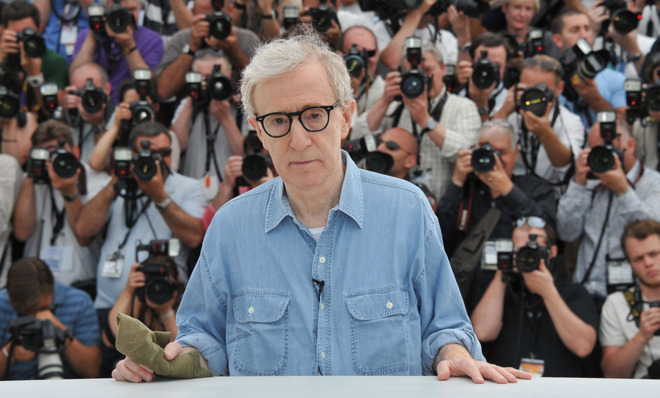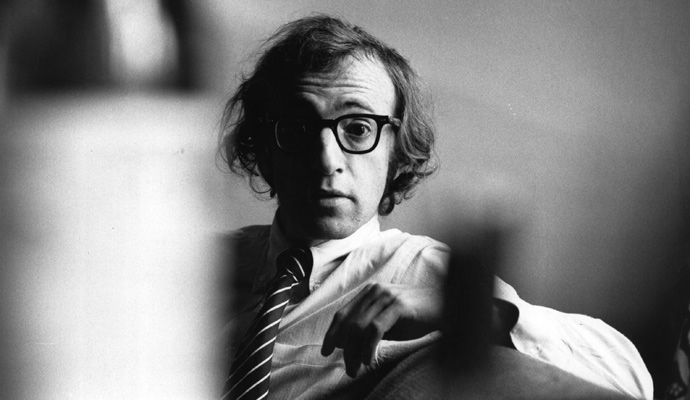Woody Allen, nihilist
When discussing allegations that he sexually abused Dylan Farrow, let's not forget the director's bleak worldview


A free daily email with the biggest news stories of the day – and the best features from TheWeek.com
You are now subscribed
Your newsletter sign-up was successful
I don't know what did or did not happen between Woody Allen and Dylan Farrow more than 20 years ago, and neither does Nicholas Kristof. What I do know is that Allen is a moral nihilist. This should not be taken as evidence that he sexually molested Mia Farrow's adopted daughter when she was 7 years old, or taken as a sign that he'd condone such behavior. But it does mean he espouses a philosophical outlook that renders him powerless to condemn it.
Let me be clear about two things right off the bat. First, I'm a great admirer of Allen's filmmaking — and like Andrew Sullivan and Rod Dreher, I think the artistry of his films can and should be judged apart from his (perhaps substantial) moral failings. Second, I consider nihilism to be a viable, albeit false and ultimately chilling, philosophical and existential position. In describing Allen as a nihilist, I am not issuing an indictment — simply describing an outlook that he has elaborated in several films and interviews over the years.
Allen's most thorough cinematic treatment of nihilism and its moral implications can be found in what may be his greatest film, Crimes and Misdemeanors (1989). The movie tells the story of an ophthalmologist named Judah Rosenthal (played by Martin Landau) who decides to kill off his lover Dolores (Angelica Houston) when she threatens to divulge their affair to Judah's wife. (Allen's Match Point (2005), an inferior film in almost every way, explores many similar themes.)
The Week
Escape your echo chamber. Get the facts behind the news, plus analysis from multiple perspectives.

Sign up for The Week's Free Newsletters
From our morning news briefing to a weekly Good News Newsletter, get the best of The Week delivered directly to your inbox.
From our morning news briefing to a weekly Good News Newsletter, get the best of The Week delivered directly to your inbox.
At first wracked with guilt over the murder, Judah eventually gets over his moral qualms. (As another character quips in the film, "comedy is tragedy plus time.") In a shocking subversion of Hollywood-style happy endings as well as Dostoevsky's Crime and Punishment — in which the character Raskolnikov is driven by unremitting guilt to confess a pair of murders to the authorities — the film ends with Judah seemingly at complete peace with himself and thriving in every way: Happy, wealthy, successful, adored by a beautiful wife and daughter, with the latter soon to be married.
The viewer is left to conclude that Judah got away with his crime scot-free — and that such an outcome is possible for anyone courageous enough to violate accepted moral customs and lucky or clever enough to avoid getting caught by the legal authorities.
The theme and its broader implications are reinforced throughout the film. In one of its most powerful scenes, Judah observes and interacts with a memory from his youth in which members of his family debate morality, God, and the Holocaust. Espousing the view endorsed by the film, Judah's atheist aunt May (whom Judah's religiously observant father dubs a "nihilist") remarks that if National Socialist Germany had won World War II, then Hitler's actions would have ended up being "right." After all, in such a nightmarish, counterfactual world, the Nazis would be empowered to set and enforce the reigning moral standard — and there simply is no higher moral authority to appeal to against such a standard. In a nihilistic universe, the overarching moral truth is that might makes right.
Aunt May's foil in the film is Ben (Sam Waterston), a pious rabbi who says that he couldn't go on living "if I didn't feel with all my heart a moral structure with real meaning and forgiveness and some kind of higher power. Otherwise there's no basis to live.... Without the law, it's all darkness." Allen reveals his attitude toward the rabbi by subjecting him to a progressive loss of vision that ends in total blindness by the conclusion of the film — a blunt metaphor for the darkness induced by his own moral and religious faith.
A free daily email with the biggest news stories of the day – and the best features from TheWeek.com

We know that this was Allen's intent because he's said so. Ben, according to Allen, "doesn't really understand the reality of life... and that's why I wanted to make him blind. I feel that his faith is blind. It will work, but it requires closing your eyes to reality." And what is reality? That "at best the universe is indifferent" to our lives and our various ways of construing right and wrong. This indifference is so awful that many of us feel driven to "create a fake world for ourselves, and we exist within that fake world."
On a lesser level you see it in sports. They create a world of football, for example. You get lost in that world and you care about meaningless things.... People by the thousands watch it, thinking it's very important who wins. But, in fact, if you step back for a second, it's utterly unimportant who wins. It means nothing. In the same way we create for ourselves a world that, in fact, means nothing at all, when you step back. It's meaningless.
As Allen explained in a more recent interview in Commonweal magazine, it was the desire to explore this sense of existential meaninglessness that inspired him to make Crimes and Misdemeanors: "Some people distort [the meaninglessness of the world] with religious things. Some people distort it with sports, with money, with love, with art... but nothing makes it meaningful.... [E]veryone goes to his grave in a meaningless way.... [O]ne can commit a crime, do unspeakable things, and get away with it, and some of them are plagued with all sorts of guilt for the rest of their lives and others aren't. There is no justice..."
There is no justice. From Plato's sociopathic sophists to Friedrich Nietzsche's ambition to "sail right over our morality," this has been the conviction and the insight of the nihilist. These are Woody Allen's philosophical compatriots.
I should note, once again, that this doesn't mean he's a sexual predator. Nothing in the outlook of a nihilist necessarily implies that he will engage in immoral actions.
All that nihilism implies is the absence of a compelling reason not to do so.
Damon Linker is a senior correspondent at TheWeek.com. He is also a former contributing editor at The New Republic and the author of The Theocons and The Religious Test.
-
 ‘This is something that happens all too often’
‘This is something that happens all too often’Instant Opinion Opinion, comment and editorials of the day
-
 House votes to end Trump’s Canada tariffs
House votes to end Trump’s Canada tariffsSpeed Read Six Republicans joined with Democrats to repeal the president’s tariffs
-
 Bondi, Democrats clash over Epstein in hearing
Bondi, Democrats clash over Epstein in hearingSpeed Read Attorney General Pam Bondi ignored survivors of convicted sex offender Jeffrey Epstein and demanded that Democrats apologize to Trump
